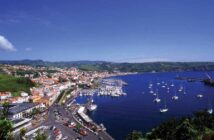- “The Grand Budapest Hotel” (2014): Directed by Wes Anderson, this comedy-drama film is set in the fictional Republic of Zubrowka, inspired by Eastern European countries, including Hungary. With its and whimsical storytelling, the movie showcases the landscapes and architecture reminiscent of Hungary.
- “Sunshine” (1999): Directed by István Szabó, “Sunshine” is an epic historical drama that spans three generations of a Hungarian-Jewish family. Set against the backdrop of turbulent Hungarian history, it explores themes of identity, assimilation, and the impact of political changes on individuals and society.
- “Son of Saul” (2015): Directed by László Nemes, this critically acclaimed Hungarian film is set in the Auschwitz concentration camp during World War II. It tells the harrowing story of Saul Ausländer, a Jewish-Hungarian prisoner, as he works in the camp and becomes determined to give a proper burial to a young boy.
- “Red Heat” (1988): Starring Arnold Schwarzenegger and James Belushi, “Red Heat” is an action-comedy film set partly in Budapest. Schwarzenegger plays a tough Soviet police officer who teams up with an American detective to track down a dangerous drug lord.
- “Mephisto” (1981): Directed by István Szabó, “Mephisto” is a chilling drama set in 1930s Hungary. It follows the life of Hendrik Höfgen, a German actor who compromises his integrity to succeed under the Nazi regime. The film provides a powerful exploration of the moral dilemmas faced by artists during times of political upheaval.
- “Embers” by Sándor Márai: Set in early 20th-century Hungary, this novel explores the complex relationship between two friends, Konrad and Henrik, as they reunite after 41 years. Against the backdrop of a decaying aristocratic society, the story delves into themes of love, friendship, and betrayal.
- “The Door” by Magda Szabó: This powerful novel tells the story of a complex relationship between a writer and her enigmatic housekeeper, Emerence, in post-World War II Hungary. Through their interactions, the book examines themes of trust, identity, and the boundaries between social classes.
- “Fatelessness” by Imre Kertész: Based on the author’s experiences as a Jewish teenager in Nazi concentration camps, “Fatelessness” depicts the struggles and survival of its protagonist, Gyuri Köves. The novel offers a deeply introspective look at the human condition and the nature of fate.
- “Journey by Moonlight” by Antal Szerb: Taking place in the interwar period, this novel follows Mihály, a restless young man who embarks on a journey across Italy as he attempts to rediscover himself and confront his past. Szerb’s exploration of identity, desire, and existential themes makes this a poignant and thought-provoking read.
- “The Melancholy of Resistance” by László Krasznahorkai: Set in a Hungarian town, this novel portrays the arrival of a mysterious circus and the subsequent chaos and hysteria that ensue. Krasznahorkai’s rich prose and the surreal atmosphere of the story create a contemplative exploration of societal disillusionment.
WANDERLIST: Hungary in books and on film
0
Share.




